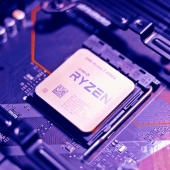-
New ZenHammer memory attack impacts AMD Zen CPUs
Academic researchers developed ZenHammer, the first variant of the Rowhammer DRAM attack that works on CPUs based on recent AMD Zen microarchitecture that map physical addresses on DDR4 and DDR5 memory chips.
- March 25, 2024
- 12:00 PM
 0
0
-
Computer memory maker ADATA hit by Ragnar Locker ransomware
Taiwan-based leading memory and storage manufacturer ADATA says that a ransomware attack forced it to take systems offline after hitting its network in late May.
- June 08, 2021
- 01:11 PM
 0
0
-
Google Chrome now gobbles up 20% less memory on Windows
Google says that the latest Google Chrome version comes with major memory savings on Windows systems and improves energy consumption and overall responsiveness.
- March 12, 2021
- 09:50 AM
 4
4
-
DDR4 Memory Still At Rowhammer Risk, New Method Bypasses Fixes
Academic researchers testing modern memory modules from Samsung, Micron, and Hynix discovered that current protections against Rowhammer attacks are insufficient.
- March 11, 2020
- 02:27 PM
 0
0
-
Four U.S. Food Chains Disclose Payment Card Theft via PoS Malware
Hackers caused havoc at four restaurant chains in the U.S. over the summer after compromising their payment systems with malware that stole customers' payment card information.
- October 03, 2019
- 08:15 PM
 0
0
-
RAMBleed Attack Can Steal Sensitive Data From Computer Memory
Researchers found a new method to impact the confidentiality of the data stored in the computer memory, successfully extracting a signing key from an OpenSSH server with nothing by normal user permissions.
- June 11, 2019
- 01:00 PM
 0
0
-
ECC Memory Vulnerable to Rowhammer Attack
Memory modules with error-correcting code (ECC) protection are vulnerable to Rowhammer, an attack that can help corrupt data the computer stores in its volatile memory chips.
- November 26, 2018
- 11:46 AM
 0
0
-
Cold-Boot Attack Steals Passwords In Under Two Minutes
Relying on computer memory's remanence behavior, security researchers figured out a way to extract sensitive data from RAM, such as encryption keys, even after the loss of power.
- September 13, 2018
- 08:19 PM
 3
3
-
Mozilla Is Working on a Chrome-Like "Site Isolation" Feature for Firefox
The Mozilla Foundation, the organization behind the Firefox browser, is working on adding a new feature to its browser that is similar to the Site Isolation feature that Google rolled out to Chrome users this year.
- July 28, 2018
- 01:27 PM
 0
0
-
Every Android Device Since 2012 Impacted by RAMpage Vulnerability
Almost all Android devices released since 2012 are vulnerable to a new vulnerability named RAMpage, an international team of academics has revealed today. The vulnerability, tracked as CVE-2018-9442, is a variation of the Rowhammer attack.
- June 28, 2018
- 11:25 AM
 0
0
-
New Rowhammer Attack Bypasses Previously Proposed Countermeasures
Security researchers have come up with a variation of the Rowhammer attack that bypasses all previously proposed countermeasures.
- October 04, 2017
- 11:05 AM
 0
0
-
DDR5 RAM Will Arrive Next Year, Will Be Twice as Fast as DDR4
Work on DDR5 (Double Data Rate 5), a standard for computer memory chips, has already begun, JEDEC, a standards body for the microelectronics industry, said on Thursday.
- April 01, 2017
- 10:30 AM
 0
0
-
Scientists Turn Memory Chips (RAM) Into Processor (CPU)
A team of researchers from universities in Singapore and Germany have found a way to turn the latest models of RAM memory chips into data processing units and effectively eliminate the need for a CPU.
- January 04, 2017
- 05:00 AM
 1
1

 0
0

















